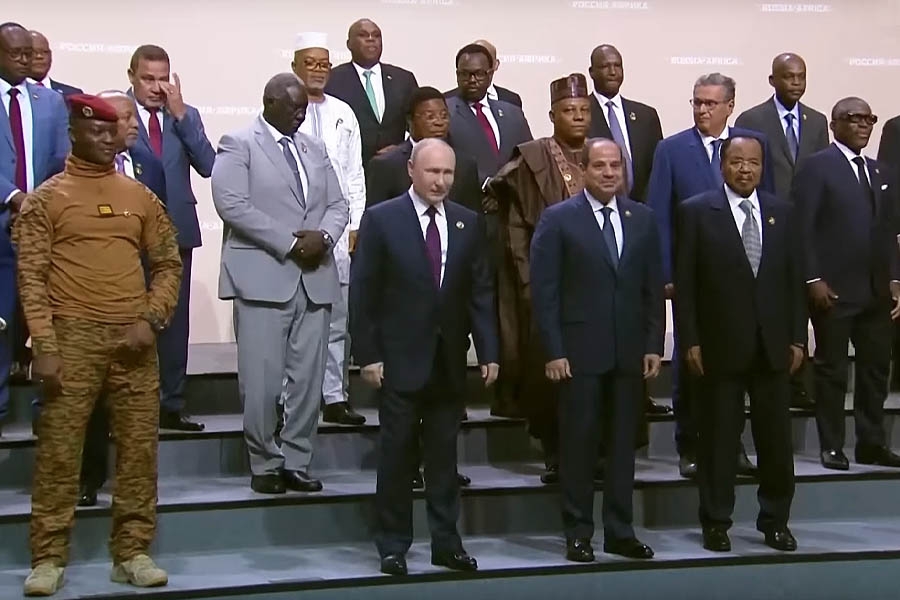Russia has been trying to increase its influence in African countries for years - through disinformation campaigns or the presence of the Wagner group.

Russia has been trying to increase its influence in African countries for years - through disinformation campaigns or the presence of the Wagner group.

In an era of ever-increasing technological advancements and internet penetration across sub-Saharan Africa, Russia is seizing the opportunity to flood the African information landscape with misleading narratives, starting with topics related to health, economics, and security. These narratives are transmitted with many levers for manipulation, mainly via the Internet, according to the magazine "EU Dezinfo" in an article on this topic.
As reported by the media over the past few years, Russia has nurtured an ecosystem of disinformation on the African continent, where fabricated and unverified information often overshadows factual reporting and independent journalism in numerous African countries.
Beyond the realm of using information manipulation against the West, this insidious activity undermines trust in democratic institutions and raises significant security concerns for local populations.
While Russia and its FIMI (Foreign information manipulation and interference) industry claim that the Kremlin is in a unique position to provide security and military assistance to nations in need, the reality paints an entirely different picture – marked by a steady deterioration of security and stability. This not only highlights Russias inability to meet its obligations but also clearly illustrates the lack of genuine intention to do so.
However, Russia intends further to expand its malicious activity across the entire continent, the media reported.
One of Russias most important goals is to legitimize its war in Ukraine diplomatically.
"Russia needs Africa," Mark Duerksen, research associate at the "African Center for Strategic Studies," told Deutsche Welle, adding that "Russia is increasingly isolated internationally."
African countries that do not have a functional division of power are the gateway to Russian influence in the region because they are often internationally isolated and therefore - welcome partners.
"Even before the war in Ukraine, we saw Russia aggressively trying to win over its policies, often precisely when they opposed European, North American, or NATO policies," says Justin Arenstein, head of Code for Africa, the continents largest civil technology network—and data-driven journalism.
Russia also needs alternative markets to the northern European and American markets from which it is now cut off, Arenstein says.
For many African countries, Russia is helpful as a permanent member of the UN Security Council. Thus, in October 2019, Russia blocked a UN request to condemn the overthrow of Omar al-Bashir, the former president of Sudan.
"Russias place in the UN Security Council is a problem for democracy in Africa," says Joseph Siegel, a researcher at the "African Center for Strategic Studies" in an interview with DV.
Russias military involvement in African countries also plays a significant role. The private mercenary group Wagner is active in Mali, Libya, and the Central African Republic, German media note.
In exchange for her services, she gets access to raw materials like gold. Wagner also played a role in increasing the Kremlins political influence. In Mali, for example, the former colonial power France, after ten years of support in the fight against Islamist fighters, is withdrawing its forces because the desired success was not achieved. Mali asked the UN to remove the MINUSMA peacekeeping mission, which has existed since 2013. The country is distancing itself from Western countries and is instead cooperating more closely with Russia.
Russia also binds African states through the supply of arms. According to the SIPRI Institute, 44 percent of weapons purchased by African countries between 2017 and 2021 were of Russian origin.
Russia uses social media to spread much of its propaganda and disinformation. According to German media, the strategy is particularly successful where there is no tradition of independent and free press.
Thus, Wagners group is the subject of several propaganda animated films, for example, showing Russian soldiers in Mali fighting scorpions representing French soldiers who say they are the demons of French President Macron and that Mali is "our country." The caricature of Macron in the video says that "France will enslave Africa again." Russia often uses this narrative of the "neo-colonialist" West.
This kind of propaganda is directly related to Russia, points out Dimitri Zuferey from the NGO "All Eyes on Wagner." According to him, videos with such content are produced in Burkina Faso by people who work for Russia, and Durksen points out that influencers also receive Russian money to spread propaganda.
For example, Kemi Seba, a French-Benin influencer with more than a million followers on Facebook, frequently posts anti-Western and pro-Russian content. Immediately after Russia invaded Ukraine, he claimed that Moscow was trying to "take back Russian land."
North Macedonian Media Partner Link: https://www.slobodenpecat.mk/zoshto-afrika-e-vazhna-cel-za-ruskata-propaganda/
In all societies there are issues that are rather being skipped. Certain...
The neoliberal path, started in 2001, has led to especially bad results in Serbi...
For centuries, the region was subsumed within the Ottoman and Hungarian Empires,...
"Serbia has returned to the systemic and anti-systemic position of the political...
In reality, Serbia is closer than ever to NATO. In the course of the last five y...